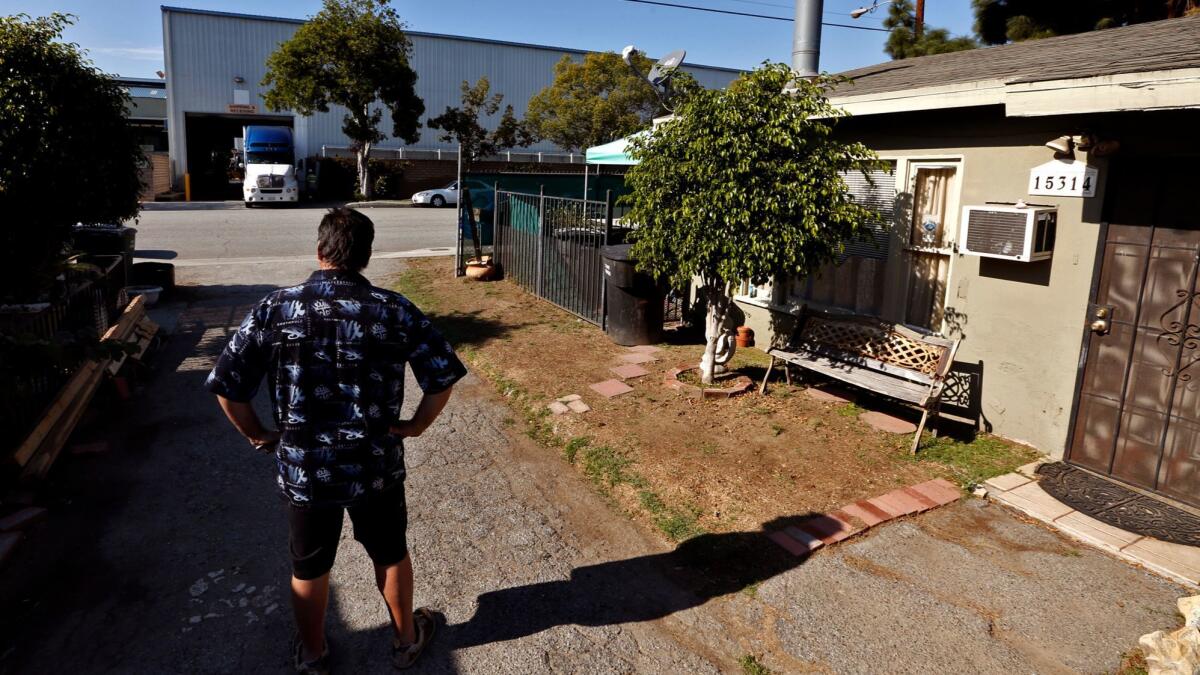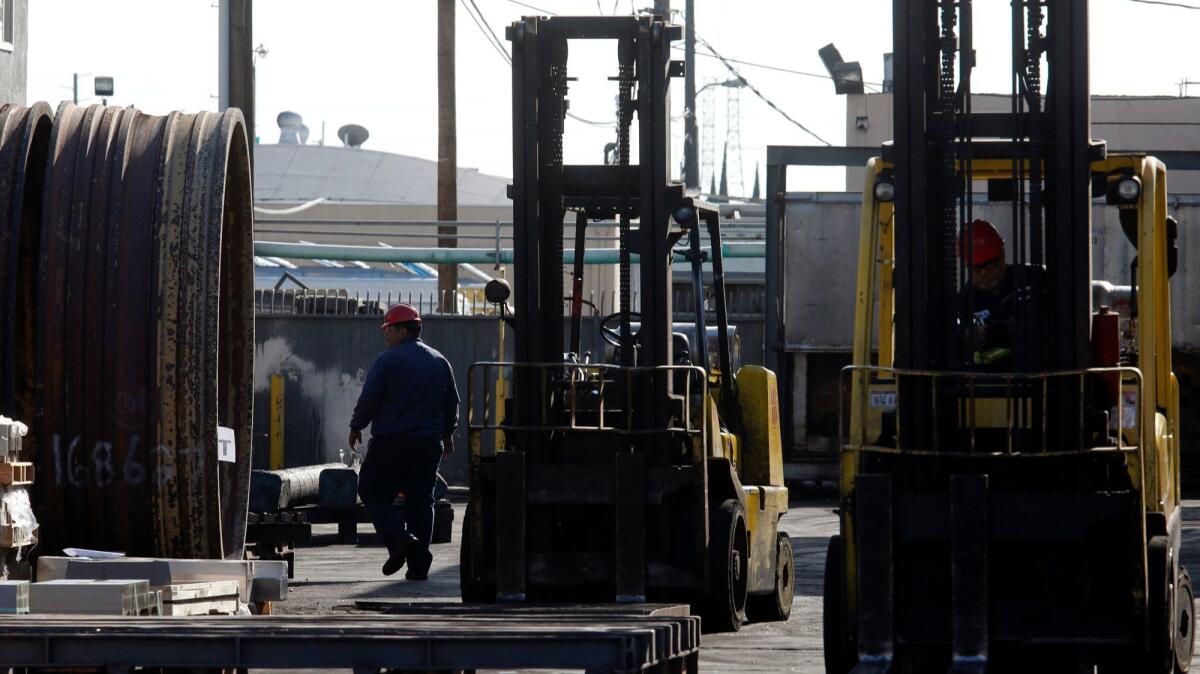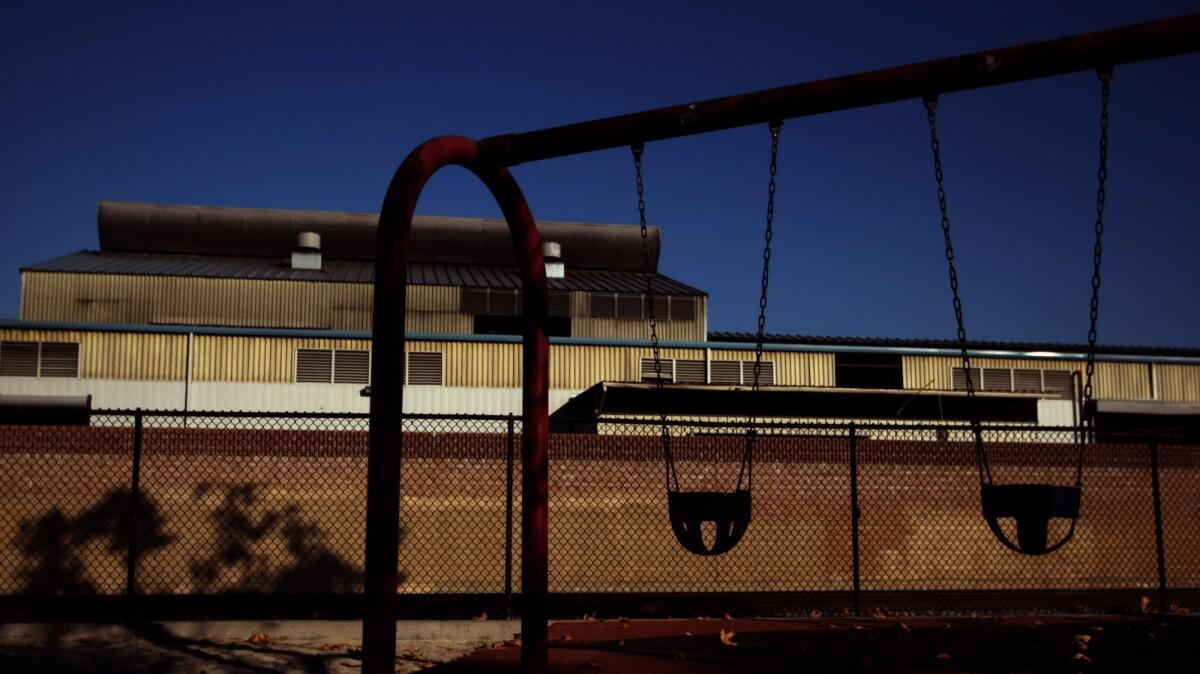Agencies were urged to address Paramount metal emissions years before air toxics scare

The recent discovery of high levels of a cancer-causing pollutant in Paramount has alarmed residents and led authorities to crack down on dangerous emissions from two metal-processing plants.
But the interventions last week by air regulators and health officials followed years of slow and sporadic steps by several agencies in response to health concerns, say residents and activists in the small city southeast of Los Angeles. If regulators had done their jobs properly, they say, they might have found out years ago that toxic emissions from metal businesses were putting neighbors at risk â and taken action.
âYou donât have to be a Sherlock to find the problem â itâs right there in the air,â said Paramount resident Damon Honaker.
Like others in the community, he has complained for years of smoke, dust and acrid odors from nearby metal operations but has noticed no improvement. âWeâve seen more faces, a lot of promises, but nothing getting done,â Honaker said.
Local, state and federal officials responsible for protecting the air, water, soil and public health began investigating in Paramount several years ago. Some found contaminated ground, polluted air and other environmental problems.
While regulators defend their response, critics say efforts to address the health threats appeared to gain urgency only in recent weeks â after air monitoring revealed hexavalent chromium, a compound known to cause lung cancer, at more than 350 times normal levels.
After weeks of investigation, the South Coast Air Quality Management District on Tuesday accused Aerocraft Heat Treating Co. and Anaplex Corp. of endangering public health and filed for an administrative order to stop them from emitting the toxic metal.
On Thursday, county health officials stepped in with similar orders against the facilities, who say they have taken steps to fix the problems. Additional enforcement actions by other agencies are expected.

While Paramount residents and activists have welcomed the recent attention, for years prior they said they tried repeatedly to prod regulators, from the U.S. Environmental Protection Agency to the L.A. County Fire Departmentâs hazardous materials division.
They pleaded with county health officials and the district attorneyâs office. They launched petitions. They canvassed neighborhoods collecting the names of people who had died of cancer.
âI hoped there would have been a swifter, broader response by all agencies given the large number of facilities emitting heavy metals known to have serious health consequences,â said Robina Suwol, who directs the environmental health advocacy group California Safe Schools.
By 2013, their efforts narrowed in on metal forging and grinding operation Carlton Forge Works, which is owned by Precision Castparts Corp., the same parent company as Aerocraft.
That year, frustrated environmentalists paid thousands to test residentsâ hair and dust in their attics near Carlton Forge Works for toxic metals and presented the results to state hazardous waste regulators.
The same year, the air district set up air monitors at a school and two other sites near the facility. And in January 2014, the agency revealed it had detected elevated levels of hexavalent chromium and nickel, another toxic metal that can harm the lungs.
The facility has since completed upgrades to its controls that âsignificantly reduced both stack and fugitive emissions,â company spokeswoman Jenny Dudikoff said.
But community members and environmentalists say they still have concerns. In particular, they have criticized the pace of a separate investigation into soil contamination near Carlton Forge Works that is being conducted by the company under an agreement with another agency, the state Department of Toxic Substances Control.
Soil and dust sampling completed in December 2014 by the company found elevated levels of arsenic, cadmium, cobalt, hexavalent chromium, lead and nickel in residential neighborhoods in a 0.2-square-mile area around the facility.
Nearly two years later, the toxics department is still evaluating whether the contaminants pose a health risk.
The department is reviewing a Nov. 2 assessment submitted by Carlton Forge Works that according to Dudikoff, the company spokeswoman, found âmetals in the soil do not pose a potentially significant hazard or increased cancer risk.â
Toxics officials have not yet decided whether cleanup is needed.

Toxics department spokesman Jorge Moreno defended the investigation, saying its cleanup and enforcement staff has been working to address the concerns since mid-2013 âand is committed to using our resources to protect the public.â
Moreno said the soil investigation has taken longer than usual and presented âunique and rare challenges.â Contributing to the delays, he said, is the departmentâs use of new methods to respond to community concerns, including rare earth metals testing and other time-consuming laboratory assessments.
The department said it was concerned primarily with cobalt and nickel readings near the facility and that rare earth metals testing âdid not indicate any concerns.â But officials said they would expand soil sampling in the area.
The toxic substances department has come under fire before for responding slowly to urgent environmental problems. That includes its handling of Exide Technologies in Vernon, the now-closed battery recycler with a history of environmental problems whose emissions are blamed for contaminating surrounding homes.
But state agencies werenât the only ones investigating in Paramount.
Federal regulators had also identified problems, including water pollution and hazardous waste violations going back to 2010 at Anaplex, one of the metal facilities targeted last week. The company agreed last year to pay a $142,200 penalty.
Records show inspections by the U.S. Environmental Protection Agency also found hazardous waste violations at Carlton Forge Works in May 2015 and in August 2014 at Weber Metals, another forging facility where nearby residents have complained of strong, headache-inducing odors.
The waste-handling and record-keeping problems were addressed and did not lead to citations against the facilities, according to the EPA and the two businesses.
âNone of our processes generate any odors that would constitute a nuisance,â said Dawn Kazoleas, a vice president for Weber Metals, adding that âwe take very serious precautions to ensure that our operations have no adverse impact on our community.â
More recently, the EPA has begun evaluating 11 metal fabrication, finishing and recycling facilities in Paramount identified by state toxics regulators as âlikely sourcesâ of soil and groundwater contamination.
EPA spokeswoman Nahal Mogharabi said the agencies âare still in the early investigative, information-gathering stageâ and did not identify the facilities so as âto not jeopardize our investigation.â
County officials had also looked into concerns raised in Paramount in the past.
Several years ago the L.A. County Department of Public Health investigated community concerns about cancer in Paramount but did not find any unusual patterns of the disease.
The L.A. County district attorneyâs office declined to comment on its ongoing investigation of facilities in Paramount.
Environmentalists and some civic leaders say the problems uncovered in Paramount show a strong need for more aggressive enforcement and better coordination among regulatory agencies.
Health officials, meanwhile, say itâs an example of serious gaps in the way environmental regulators police industries in neighborhoods across the region that are overburdened with multiple pollution sources.
Dr. Cyrus Rangan, who directs the county health departmentâs Bureau of Toxicology and Environmental Assessment, said current pollution regulations do not offer enough protection to such communities and should be changed to âaddress not only what an industrial facility does, but also where an industrial facility is located.â
To read the article in English, click here
More to Read
Sign up for Essential California
The most important California stories and recommendations in your inbox every morning.
You may occasionally receive promotional content from the Los Angeles Times.











